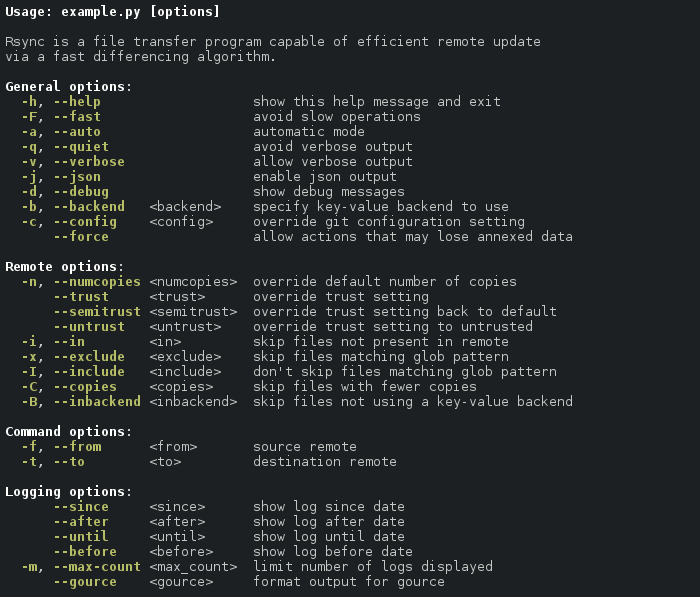Introduction¶
This module provides two help formatters for optparse. They provide terser and more customizable option formatting in comparison to the default help formatter.
A CLI (see example.py) using the default
optparse.IndentedHelpFormatter looks like:

Not bad, but the verbose $short $metavar, $long=$metavar format
causes excessive word wrap, which in turn makes the usage a little
hard to skim through.
The same CLI with optparse_mooi.CompactHelpFormatter:

Or with the colorizing version of the compact formatter -
optparse_mooi.CompactColorHelpFormatter:

Installation¶
The latest stable version of optparse-pretty is available on pypi, while the development version can be installed from github:
# latest stable version
$ pip install optparse-pretty
# latest development version
$ pip install git+git://github.com/gvalkov/optparse-pretty.git
Alternatively, you can just copy the optparse_mooi.py module to your project:
$ wget https://raw.githubusercontent.com/gvalkov/optparse-pretty/master/optparse_mooi.py
Usage¶
The most basic use case is:
from optparse import OptionParser
from optparse_mooi import CompactHelpFormatter, CompactColorHelpFormatter
parser = OptionParser(formatter=CompactHelpFormatter())
parser = OptionParser(formatter=CompactColorHelpFormatter())
The help formatters take the following keyword arguments. The defaults are:
CompactHelpFormatter(
metavar_format = ' <{}>',
metavar_column = None,
option_separator = ', ',
align_long_opts = False,
help_string_formatter = None,
preformatted_description = True,
preformatted_epilog = True
)
CompactColorHelpFormatter(
heading_color = 'white-bold',
usage_color = 'white-bold',
shopt_color = None,
lopt_color = None,
description_color = None,
epilog_color = None,
metavar_color = None,
help_color = None,
option_colormap = None
)
CompactColorHelpFormatter also accepts all of
CompactHelpFormatter‘s arguments.
Several examples that demonstrate the effects of various options:
metavar_format:
>>> HelpFormatter()
-x EXCLUDE, --exclude=EXCLUDE skip files matching glob pattern
>>> CompactHelpFormatter(metavar_format=' ${}')
-x, --exclude $exclude skip files matching glob pattern
>>> fmt = lambda opt: ' ' + str.upper(opt.metavar or opt.dest)
>>> CompactHelpFormatter(metavar_format=fmt)
-x, --exclude EXCLUDE skip files matching glob pattern
metavar_column:
>>> CompactHelpFormatter()
-I, --include <include> don't skip files matching glob pattern
-C, --copies <copies> skip files with fewer copies
-B, --inbackend <inbackend> skip files not using a key-value backend
>>> CompactHelpFormatter(metavar_column=17)
-I, --include <include> don't skip files matching glob pattern
-C, --copies <copies> skip files with fewer copies
-B, --inbackend <inbackend> skip files not using a key-value backend
option_separator:
>>> CompactHelpFormatter()
-I, --include <include> don't skip files matching glob pattern
>>> CompactHelpFormatter(option_separator='|')
-I|--include <include> don't skip files matching glob pattern
align_long_opts:
>>> CompactHelpFormatter()
-n, --numcopies <numcopies> override default number of copies
--trust <trust> override trust setting
--semitrust <semitrust> override trust setting back to default
--untrust <untrust> override trust setting to untrusted
-i, --in <in> skip files not present in remote
>>> CompactHelpFormatter(align_long_opts=True, metavar_column=17)
-n, --numcopies <numcopies> override default number of copies
--trust <trust> override trust setting
--semitrust <semitrust> override trust setting back to default
--untrust <untrust> override trust setting to untrusted
-i, --in <in> skip files not present in remote
Using the colorizing version of CompactHelpFormatter:
CompactColorHelpFormatter(
heading_color = 'white-bold',
usage_color = 'white-bold-underline',
shopt_color = 'green-bold',
lopt_color = 'green-bold',
metavar_color = 'white-bold',
help_color = 'green',
description_color = 'white'
)

CompactColorHelpFormatter(
option_colormap = {
... # same options as above
'-B': ('white', 'white-bold', 'green-bold', 'red-bold'),
('-f', '--to'): ('red-bold', 'red', 'white', 'blue-bold'),
})

Keys are short or long opts, or a list of short or long opts. Values
specify the color to be applied to the short flag, long flag, metavar
and help message, in that order. Each of these can be None or a
color specifier (e.g. "white-bold-underline")
Please refer to the module’s docstrings for more usage information.
Note that CompactColorHelpFormatter is not very robust (it would
be immeditiately evident if you had a look at its implementation). It
also works only on ANSI capable terminals.
Isn’t optparse obsolete?¶
Even though optparse is no longer developed and has less features than argparse, it is perfectly usable and quite practical. Some arguments for not feeling bad about still using it:
- It’s simpler and shorter than argparse (1.7k vs 2.4k sloc).
- It’s easier to customize. I’ve tried writing similar help formatters for argparse and it was considerably less straightforward.
- Optparse has been in the STL since version 2.3 - argparse since 3.2.
If you don’t happen to need any of argparse’s great features, optparse is a fine alternative (and so is getopt, if you need even less features).
License¶
This module is released under the terms of the Revised BSD License.